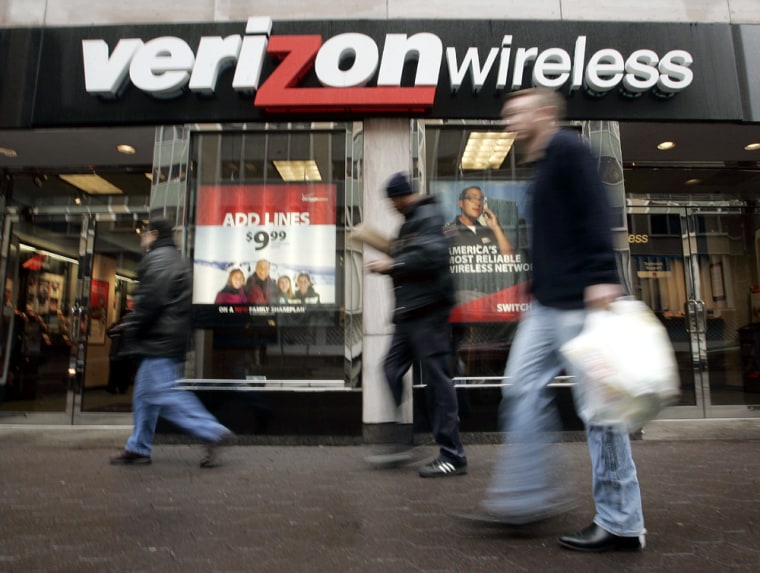Verizon Communications Inc. has agreed to acquire MCI Corp. for more than $6.7 billion in a deal that snatches the once-troubled long-distance provider away from a rival bid and represents the third big telephone industry merger in two months.
The agreement, scuttling a competing bid for MCI by Qwest Communications International Inc., was announced Monday morning. The boards of directors of both companies approved the agreement.
The purchase price was about a half billion dollars below what Qwest offered for MCI, which recently changed its name from WorldCom Inc. after emerging from bankruptcy and a huge financial fraud.
Verizon, the dominant local phone company in the Northeast and a top cellular player, likely won MCI’s favor because it is larger and in better financial shape than Qwest, the local phone carrier across the more sparsely populated Rocky Mountains and Pacific Northwest.
Denver-based Qwest had no immediate comment on the deal when contacted on Monday.
The deal values MCI’s stock at $6.75 billion, or $20.75 per share — equal to Friday’s closing price on the Nasdaq Stock Market. But in pre-market trading Monday, MCI’s shares sank 75 cents.
Under the agreemnt, Verizon will pay $4.795 billion worth of its stock and $488 million in cash for MCI’s shares. In addition, MCI shareholders will be paid dividends worth $1.463 billion.
Verizon is also assuming MCI’s debt, expected to total $4 billion at closing, and estimates the acquisition will yield about $1 billion per year in pre-tax operational savings.
The deal is subject to MCI shareholder approval and requires regulatory approval, which the companies hope to get in about a year.
The deal comes some two weeks after a $16 billion deal reached between AT&T Corp. and SBC Communications Inc., a top rival for both Verizon and Qwest.
“For Verizon, this deal represents a ‘Why not?’ strategy. With significant financial security, Verizon can easily pull this deal off,” said Ben Silverman, telecom analyst for investment newsletter FindProfit.com. “The deal cements Qwest’s place as an ‘also-ran’ and ‘has been’ in the telecom arena.”
MCI investors are said to have reacted poorly to the prospect of being paid with shares of stock in Qwest, a company marred by its own accounting scandals and a more questionable future.
The buyout marks an abrupt change of direction for Verizon, which just two weeks ago dismissed the notion it needed to respond to either an SBC-AT&T deal or the merger agreement between Sprint Corp. and Nextel Communications Inc. in December.
Analysts and investors widely expected that Verizon would realize the need to counter the competitive advantage SBC will gain with AT&T despite that company’s rapidly shrinking business.
And though many said New York-based Verizon would have preferred to wait before cutting a deal, or possibly even bid for Sprint instead, the company apparently decided it needed to act once Qwest made its play for MCI.
“This is the right deal at the right time,” said Verizon Chairman and CEO Ivan Seidenberg. “It is a natural and logical extension of Verizon’s strategy to transform our company to serve growth markets and offer broadband technologies.”
MCI’s business isn’t as large as AT&T’s, but its network would give Verizon a national footprint with which to serve large companies hesitant to trust their communications to a regional service provider. MCI also would jump-start that effort with its base of corporate clients and an established sales force.
“With our heritage of innovation, global network and world-class Enterprise capabilities, MCI is the right partner for Verizon,” said Michael D. Capellas, MCI president and CEO.
On the consumer side, AT&T and MCI also bring a big base of residential customers to whom SBC and Verizon would like to market the cable TV services they plan to roll out starting later this year. Both SBC and Verizon are investing billions to upgrade their networks to deliver video and interactive services.
MCI, based in Ashburn, Va., emerged from bankruptcy last spring after a multibillion-dollar accounting scandal which nearly destroyed the company.
Former chief executive Bernard Ebbers is currently being tried on criminal charges in the fraud, which boosted the profits WorldCom reported by hiding billions of dollars in expenses and inflating revenues. Former chief financial officer, Scott Sullivan, became the government’s lead witness against Ebbers after pleading guilty in the scandal.
The company, once worth $180 billion on the stock market, wiped away most of its debt in the bankruptcy reorganization.
But a combination of price wars, unfavorable regulatory changes, and competition from cell phones and Internet-based calling made it unlikely the company could survive on its own for the long term, so Capellas immediately began shopping the company around to prospective buyers.
